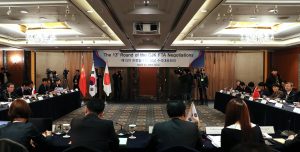The successful conclusion of the negotiations for the Regional Comprehensive Economic Partnership (RCEP) is a major development for all of its members, and for South Korea and Japan in particular. The deal will give the two countries their first ever free trade agreement (FTA) at a time when bilateral ties are struggling due to historical issues, and may at least help prevent relations from deteriorating any further.
The recent spike in tensions stems from two 2018 South Korean Supreme Court rulings that deemed several Japanese steel companies guilty of using forced South Korean labor during World War II and ordered compensation for these workers. Citing “a considerable loss of trust,” Tokyo responded by removing South Korea from its “white list” of trade partners and placed new export restrictions on three components crucial to South Korea’s lucrative semiconductor industry. In turn, Seoul threatened to withdraw from an intelligence sharing agreement and the South Korean public boycotted Japanese goods, which had a limited impact on the overall trade numbers but hit some sectors particularly hard.
Though South Korea and Japan have had their fair share of disagreements over historical issues in recent decades, what sets this ongoing row apart from others is that it has spilled over into the economic relationship. According to research by Kristin Vekasi at the University of Maine and Jiwon Nam at the University of Delaware, heightened political tensions between Tokyo and Seoul did not affect business or consumer behavior in either country prior to this latest flareup. Strains on the broader relationship have, however, derailed economic agreements – political tensions were at least partially responsible for the gridlock in negotiations for a bilateral FTA that began in 2003, and were directly responsible for Japan’s decision to let a bilateral currency swap agreement expire in 2017.
The multilateral nature of RCEP was likely a key factor in getting both sides to work out a trade agreement, and now the possibility for greater economic integration could cause both capitals to think twice before responding to political tensions with punitive trade measures.
Among the 15 countries party to RCEP, which collectively make up a whopping 30 percent of global GDP, Japan and South Korea are expected to see some of the highest gains – in no small part due to the greater accessibility to each other’s economies. One study by trade scholars Peter Petri and Michael Plummer projects that real incomes in both countries will increase 1 percent by 2030 as a result of RCEP, more than for any other members. Under the agreement, Japan and South Korea will eliminate tariffs on 83 percent of goods trade between the two countries.
While other FTAs are more ambitious in this respect – the Comprehensive and Progressive Trans-Pacific Partnership (CPTPP) is slated to ultimately eliminate 99.9 percent of tariffs among members – this nonetheless represents a substantial jump from existing levels. For instance, only 19 percent of Japan’s exports to South Korea currently do not face import duties. However, some of the most significant tariff reductions by item – such as steel and autos – are in areas where each country is very competitive and thus may see more gains from trade in these sectors with ASEAN and other markets. Still, it is expected to have a significant impact on trade between the two countries, which are both each other’s third largest trading partner.
RCEP is also likely the first of more steps that will shape the regional trade architecture, and a Seoul-Tokyo relationship that can at least be constructive on these issues will be crucial to advance the future needs of both countries. Tokyo’s efforts to incorporate more ambitious trade rules from the Trans-Pacific Partnership (TPP) after the United States withdrew from the agreement in early 2017, and its ultimate stewardship of the CPTPP, are indicative of its interests beyond what is included in RCEP. While less ambitious than some other agreements, tariff liberalization was the primary focus of RCEP. The deal did not go very far in the way of addressing more difficult non-tariff barriers such as rules on competition, labor, and the environment. Even though Seoul is not party to the CPTPP, it has expressed interest in joining for many of the same reasons that led Tokyo to help push through the agreement without Washington. Now that RCEP has been concluded, ascension to the CPTPP would be the logical progression for Seoul. A more stabilized South Korea-Japan relationship could certainly help in this regard, as well as with a potential future China-Japan-South Korea (CJK) FTA.
With the signing of RCEP, Beijing is hoping to capitalize on the momentum to finally conclude the CJK FTA talks, which have stalled in recent years. However, Japan and South Korea likely face the same concerns in dealing with China. South Korea already has a trade deal with China, but it is fairly limited in scope stemming from Beijing’s slow and incremental approach to trade liberalization, which has prevented a trade deal with Japan altogether. Shared interests in having as much access to the Chinese economy as possible as well as areas like protecting intellectual property rights and rules governing exports from China’s massive state-owned enterprises could be better achieved if both South Korea and Japan are able to work closely on these issues.
While further cooperation on trade cannot be an effective substitute for addressing difficult historical issues, it may help incentivize leaders in both Tokyo and Seoul to avert future downward spirals in the relationship, including no longer weaponizing trade interdependence. This may not seem like much, but with relations strained as they are, every little bit helps.

































